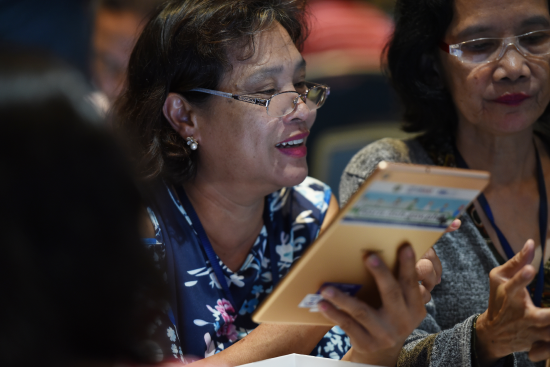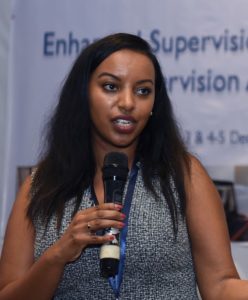
08 Jan Three Questions with Mekdelawit Bayu: Enhancing supervision to strengthen health worker performance

Mekdelawit Bayu is a technical project manager on HRH2030, working on the “Enhancing Supervision” activity. She is currently digitizing and managing survey instruments and handles analysis and quality assurance of research data coming from Mali and the Philippines. Prior to joining HRH2030, Mekdelawit worked with the Health Systems Strengthening team on the USAID Global Health Supply Chain Program-Procurement and Supply Management (GHSC-PSM) project at Chemonics. She holds a master’s degree in international development practice, with a focus on monitoring, evaluation, and learning (“MEL”) and management from the Humphrey School of Public Affairs. Mekdelawit was born and raised in Ethiopia and moved to the U.S. in 2008.
Question 1: Let’s delve into the HRH2030 “Enhancing Supervision” activity— what does “enhancing supervision” really entail?
The strength of a health system—and ultimately the health of a population—depends upon health worker performance. However, insufficient support to build, manage, and optimize human resources for health (HRH) results in an inadequate quantity and poor quality of health workers in low-and middle-income countries. As such, effective health worker supervision approaches and practices are one of the essential elements that help compensate for shortfalls in HRH training, management, and efforts to improve quality of health services.
We work from USAID’s 2017 Acting on the Call report, which defined enhanced supervision as “a broad set of supervisory interventions that improve provider performance through team-based learning approaches, including supportive supervision, the use of checklists, and in-person visits.” One of the interesting aspects when looking at supervision is the number of synonymous terminologies that have been used to describe what are in essence the same approaches and principles. These include facilitative, effective, integrated, advanced, or supportive supervision. For example, in 1999 EngenderHealth defined facilitative supervision as an approach to continuous quality improvement in health service delivery and they considered mentoring, joint problem-solving, and two-way communication as components of this.
Question 2: How is HRH2030 going about exploring what it means in practice to actually “enhance” supervision and if/how enhancements can benefit a health system?
To document examples of how enhanced supervision concepts translate to practice, HRH2030 conducted a landscape analysis as Phase I of this activity. The study sought to find evidence-based practices and the combination of supervision approaches and/or components that enhance, or positively impact, provider competency, satisfaction, facility readiness, client satisfaction, and/or health outcomes. The detailed report and summary findings from Phase I are on our website.
Building on USAID’s 2017 enhanced supervision definition, we consider enhanced supervision as a health system strengthening approach that advances and sustains continuous quality improvement practices through applying one or more of the following supervision components or methods: digital health data integration and use; clinical mentoring; community engagement in service delivery oversight; and/or taking a whole of systems approach to look at the health system, where supervision is involved, from a holistic perspective.
With this context, we began Phase II of the activity by designing interventions for our applied research. HRH2030 selected Mali and the Philippines as focus countries based on pre-defined selection criteria, including the existence of a country-led functional supervision system, demonstrated interest by local government counterparts, and possibility to sustain and scale-up interventions based on research findings. In both Mali and the Philippines, our primary enhancements are “digital health data integration and distance supervision.” We are working with government counterparts in each country to digitize existing supervision checklists; advance data visibility and access through dashboards for health facilities, supervisors, and administrators to facilitate evidence-based decision-making; and to institutionalize quality improvement at the service delivery point through facility-level self-assessments.
In Mali, we digitized supervision checklists using their existing district health information software or DHIS2. This is great because it allows us to easily synchronize supervision and health service delivery data in one location using the built-in dashboard functionality. In the Philippines, HRH2030 developed a supervision app to facilitate digital action planning and provide automated reminders for follow-up in between supervision visits.
Question 3: Looking more closely at Mali and the Philippines, why is enhancing supervision so important to strengthening the health workforce in these two particular countries? What do you anticipate being the overall impact to their health systems?
Although the verdict is still out on how enhanced supervision makes a significant difference to strengthening the health workforce in Mali and the Philippines, anecdotally, our government counterparts and health workers in both countries have attested to the benefits of their current supervision systems. Our interventions there were co-created with our local government counterparts and designed to close identified gaps and build on their existing systems, so we assume the perceived benefits will likely continue or yield better results.
While the supervision systems and health areas we are covering in this research activity are very different in both countries, I think the most useful and exciting aspect of enhanced supervision is data visibility across all levels – from the health facility to the district, regional, and national health offices. The hope is to instill the culture of data use and data-informed decision-making.
Another element is distance supervision aided by facility self-assessments. In Mali’s Mopti region, some areas are inaccessible due to security concerns, which means health facilities in those locations don’t receive supervision visits for what may be months. In the Philippines, in Leyte for example, natural disasters are common, which can make access to health facilities difficult in case of emergencies. In both countries, due to competing priorities and low resources, transportation to far-flung facilities can also be cost-prohibitive. For these reasons and more, I think distance supervision will serve as an effective stop-gap measure to supervision for vulnerable and inaccessible communities.
In terms of workload for providers, supervisors, and administrators, we anticipate that digitization will increase efficiency in work processes and reduce the workload for supervision activities. The need for paperwork, filling in paper forms and manually entering data into excel databases, and human error in tabulation and data entry will all be minimized. Paperwork and human error may not only delay reporting and render a wealth of data mainly unusable, but can also affect how decisions are made, which has cascading effects on health workers, service delivery quality, and ultimately health outcomes and customer satisfaction.
Overall, I think we have identified previously missed opportunities in both countries and designed our interventions to capitalize on these opportunities and support providers, supervisors, and administrators by streamlining reporting, reducing paper-based administrative work, and improving decision-making through the use of data.
We look forward to learning more and sharing our findings from both countries this year!
PHOTO: A participant explores her new tablet at the December 2019 HRH2030 “Enhancing Supervision” event where supervisors and supervisees representing public and private health facilities in Leyte Province of the Philippines received training on an app to enhance health worker supervision. Learn more about the event here and HRH2030’s activity here. Credit: Alan Blue Motus, HRH2030.





